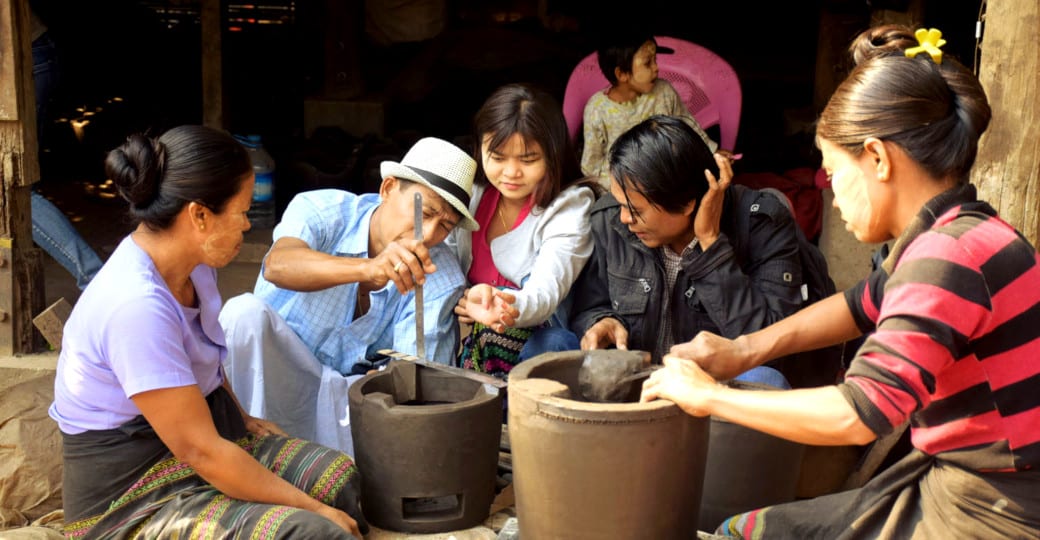CONTROLLING
ENERGY DEMAND
Supporting the adoption of socio-anthropological, technical and economic energy saving and efficiency solutions appropriate to the operational context.
MISSIONS AND CHALLENGES
As the keystone of the energy and ecological transition, Energy Demand Management should help to monitor and speed up moves from fossil fuels to renewables. For Geres, it is a vital tool in both combating poverty and improving the economic performance of businesses and efficient public service provision.
Geres operates at different levels, including territorial and local authorities, industrial VSEs and SMEs which consume energy or producers, suppliers and installers of innovative efficient technologies, as well as household energy consumers, especially the most vulnerable. For the latter, the aim is to reduce their energy poverty and their climate impact and vulnerability, while improving their living conditions.
In practice, Geres activities contribute to improvements in cooking (improved ovens and stoves) and heating (stoves, hammams and industrial steam production) appliances as well as the built environment, through the development of bioclimatic buildings (housing, commercial buildings, bioclimatic greenhouses) and energy renovation of buildings. In parallel and to optimize the implementation of the technical solutions proposed, Geres carries out multi-stakeholder awareness campaigns aimed at changing practices and behaviour in the interests of modest, responsible energy consumption.

A VARIED FIELD OF EXPERTISE
Housing and daily life
- Improving homes: energy renovation/bioclimatic housing
- Reducing energy consumption (particularly electricity) through changes in behaviour or improvements in appliances
- Promotion of improved stoves (read our positioning on the topic)
Craft sector, businesses and services
- Efforts to improve the energy efficiency of hammams in Morocco
- Improved ovens for small-scale bakers (and the food-processing industry)
- Optimization of biomass use in industry
- Energy efficiency advice for SMEs
Public buildings
- Efficient renovation of public buildings
- Raising awareness of energy saving, especially in educational establishments (middle schools in the Sud region of France) and establishments open to the public (e.g. mosques)
Agriculture
- Development of passive solar greenhouses (Mongolia, France), bioclimatic cellars and other energy-efficient agricultural buildings (henhouses, cowsheds, etc.)
DIRECT IMPACTS IN RELATION TO THE SDG’S
-
- Reducing household energy poverty (improving thermal comfort and lowering energy expenditure)
- Contributing to sustainable economic development by supporting value chains and creating activities and jobs based on emerging initiatives to promote energy management
- Improving women’s working conditions through the use of improved stoves for domestic and productive purposes.
- Reducing air pollution and the related illnesse.
Geres work contributes directly to 4 SDGs
- ODD 1: Eradication of poverty
- ODD 8: Access to decent work
- ODD 9: Industry, innovation and infrastructure
- ODD 13: Climate action
CROSS-CUTTING APPROACHES GUARANTEEING QUALITY
To ensure the sustainability and scaling up of our activities, Geres expertise is provided according to methodological principles with one major ambition: enabling the most vulnerable to become decision-makers and stakeholders in the energy transition.
In the field of energy demand management, we have adopted the following approaches:
Territorial approach
To promote energy demand management in territorial energy transition processes by reducing/optimizing energy needs to optimize the development needs of renewable energy production units. In the case of projects to reduce energy poverty, the territorial approach helps to pinpoint the most exposed groups and identify the most appropriate local partners.
Capacity-building
Supporting and advising local stakeholders to facilitate scaling up and rollout of energy demand management-related activities.
